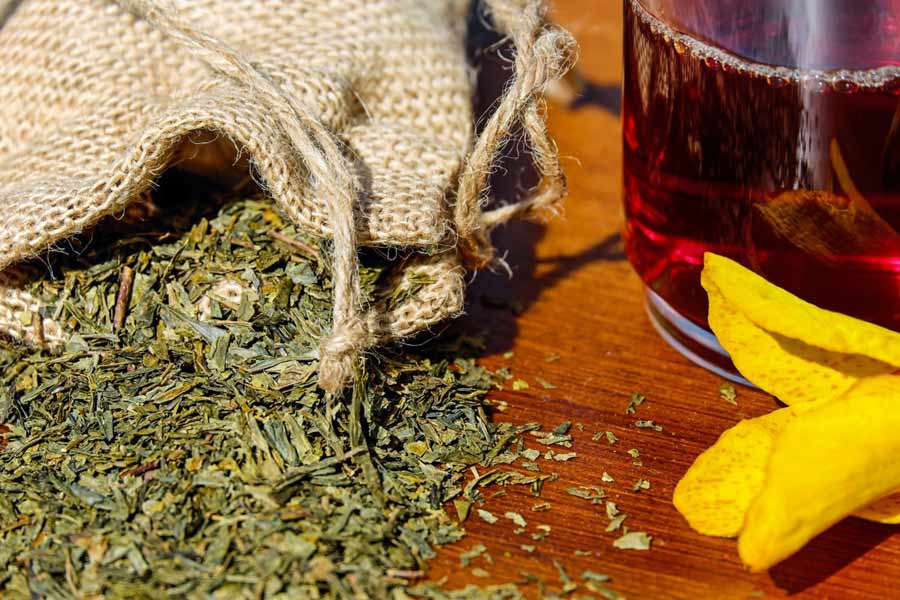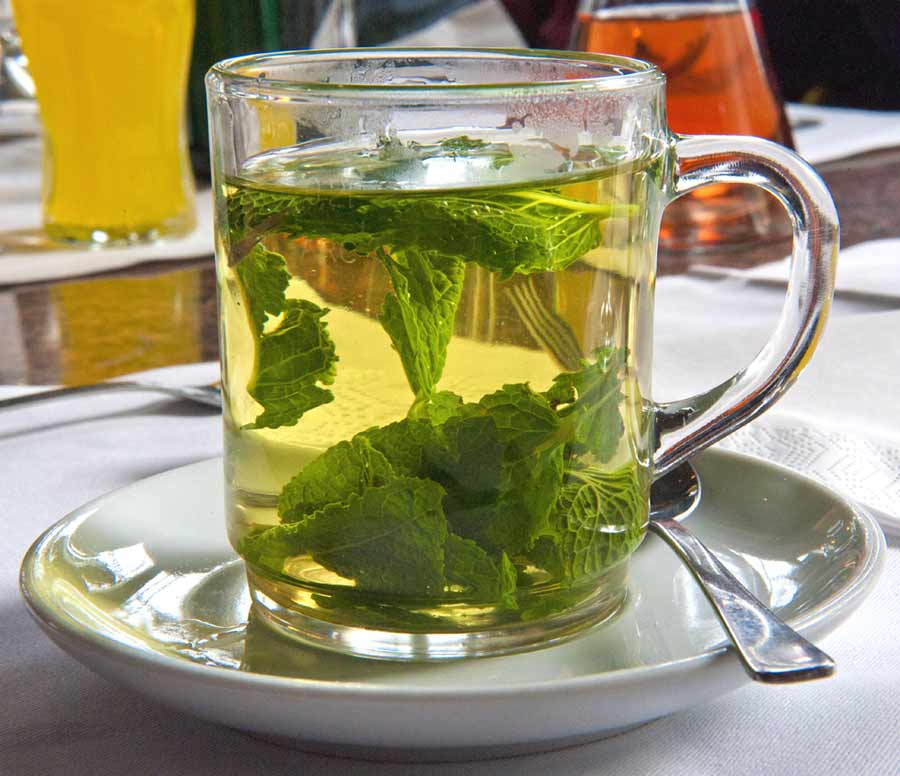What are some crucial health benefits of drinking ginger tea before bed? Ginger tea, an aromatic elixir derived from the rhizome of the Zingiber officinale plant, stands as a time-honored beverage celebrated for its multifaceted health benefits. As a prelude to the journey into the world of ginger tea, it unveils a rich tapestry of soothing flavors and therapeutic properties. Particularly noteworthy is its appropriateness before bedtime, where this infusion not only gratifies the senses but also unfolds a cascade of proven advantages contributing to overall well-being.
Proven Health Benefits of Drinking Ginger Tea Before Bed
While ginger tea may not possess direct sleep-inducing properties, it offers a comforting and potentially beneficial prelude to bedtime. Ginger tea’s virtues lie in its ability to reduce inflammation and alleviate pain, making it a soothing elixir for those dealing with sore muscles or bodily discomfort. The warmth and aroma of ginger tea can create a cozy bedtime ritual, providing a moment of relaxation and tranquility before sleep.
1. Enhanced Sleep Quality
In the quiet moments preceding bedtime, the act of savoring ginger tea transcends beyond a mere ritual; it becomes a conduit to improved sleep quality. Natural compounds like gingerol and zingerone within ginger exert a gentle influence on the nervous system. This calming effect becomes a lullaby for the senses, orchestrating a serene transition into a restful night’s sleep. Ginger tea, in this context, emerges as a subtle yet effective remedy, potentially alleviating the disruptive grip of insomnia and paving the way for a night of profound repose.
2. Anti-Inflammatory Potency
In the intricate landscape of health, where chronic inflammation looms as a pervasive concern, ginger tea emerges as a natural remedy endowed with potent anti-inflammatory properties. The ritual of indulging in a cup of ginger tea before bedtime becomes more than a sensory delight—it becomes a strategic measure to empower the body against inflammatory challenges. The bioactive compounds within ginger unleash their anti-inflammatory effects, potentially offering relief from conditions like arthritis. As the soothing elixir courses through the system, it becomes a balm for the body, paving the way for a restful night’s sleep unburdened by the specter of inflammation.
3. Immune System Support
In the realm of health fortification, ginger stands as a stalwart guardian, and the integration of ginger tea into the bedtime routine becomes a strategic maneuver to reinforce the body’s defense mechanisms. The well-documented immune-boosting properties of ginger unfold as a nightly ritual, where the antioxidants within ginger tea embark on a mission to combat free radicals. This nocturnal skirmish against oxidative stress becomes a preventative measure, potentially erecting a formidable shield against infections and fortifying the immune system. Ginger tea, before bedtime, becomes more than a comforting beverage—it becomes a robust elixir, weaving a protective cloak against nocturnal health threats.
4. Weight Management
For those navigating the labyrinth of weight management, the inclusion of ginger tea into the bedtime routine becomes a subtle yet effective strategy. The thermogenic properties inherent in ginger become a silent ally in the pursuit of weight goals. As individuals peacefully rest, ginger tea subtly boosts metabolism, facilitating calorie expenditure even during the tranquil hours of sleep. This strategic support, woven into the fabric of the bedtime routine, becomes a quiet contributor to the broader journey of weight maintenance or loss. Ginger tea, in this context, becomes more than a nightly indulgence—it becomes a nuanced companion in the quest for a balanced and healthier lifestyle.
5. Stress Reduction
In the relentless rhythm of daily life, where the strains of the day can manifest as stress and anxiety, the introduction of ginger tea as a bedtime ritual becomes a nuanced strategy for mental well-being. Ginger, with its bioactive compounds, steps into the role of a stress-buster. The anxiolytic properties within ginger tea unfold as a calming embrace for the mind, transforming the prelude to sleep into a serene and stress-free interlude. Beyond its role as a beverage, ginger tea becomes a therapeutic elixir, offering a gentle transition from the hustle of the day to the tranquility of the night.
6. Blood Sugar Regulation
The intricate dance of maintaining stable blood sugar levels takes center stage in the quest for overall health, and ginger tea emerges as a potential ally in this metabolic balancing act. The act of sipping ginger tea before bedtime becomes a deliberate choice with metabolic ramifications. The bioactive compounds in ginger contribute to enhancing insulin sensitivity, playing a pivotal role in the regulation of blood sugar levels. This strategic consumption becomes a nocturnal guardian, reducing the risk of disruptive nocturnal fluctuations that could otherwise disturb the delicate dance of sleep. Ginger tea, in this context, becomes more than a bedtime beverage—it becomes a metabolic modulator, subtly working towards the maintenance of physiological equilibrium while one peacefully slumbers.
7. Digestive Elixir
Ginger, with its well-established reputation as a digestive aid, takes center stage in the nightly repertoire as a digestive elixir. The active compounds nestled within ginger come to life in the form of ginger tea, stimulating the production of digestive enzymes. This enzymatic symphony unfolds as a facilitator for smoother digestion, laying the foundation for a harmonious gastrointestinal experience. The consumption of ginger tea before bedtime becomes a proactive measure, diminishing the likelihood of indigestion or bloating that might otherwise cast a shadow on the pursuit of a peaceful and undisturbed night’s sleep.
8. Respiratory Wellness
In the delicate ecosystem of respiratory health, ginger emerges as an excellent ally, armed with potent antimicrobial and anti-inflammatory qualities. The act of sipping ginger tea before bedtime transforms into a therapeutic intervention for respiratory well-being. Ginger’s multifaceted attributes come to the forefront, offering relief from issues such as congestion or coughing. This bedtime ritual becomes a gentle facilitator, promoting clear airways and ensuring unobstructed breathing—an essential component for an undisturbed night’s sleep. Ginger tea, in this context, becomes a breath of freshness, not just for the senses but for the respiratory system, crafting an atmosphere conducive to serene slumber.
9. Menstrual Pain Relief
In the realm of natural remedies, ginger tea steps forward as a comforting ally for individuals grappling with menstrual discomfort. The analgesic and anti-inflammatory properties of ginger tea become a source of respite during challenging times. The act of consuming ginger tea before bedtime transforms into a soothing remedy, potentially alleviating menstrual pain and creating a pathway for a restful night. This bedtime ritual becomes more than a sip—it becomes a natural and gentle support system, offering solace during moments that demand extra care. Ginger tea, in this context, becomes a compassionate companion, providing relief when it’s needed most.
10. Antioxidant Richness
In the realm of health preservation, ginger emerges as a treasure trove of antioxidants, with gingerol taking center stage. The act of consuming ginger tea before bedtime transforms into an antioxidant-rich infusion, a nightly ritual that unleashes a wave of protective molecules against oxidative stress. Ginger tea becomes an elixir, infusing the body with antioxidants capable of neutralizing free radicals. This bedtime antioxidant ritual becomes more than a pleasant sip—it becomes a shield, promoting cellular health and potentially putting a gentle brake on the relentless march of the aging process. Ginger tea, in this context, becomes a nightly fountain of youth—a sip into the rich reservoir of antioxidants, fortifying the body against the passage of time.
11. Cognitive Function Enhancement
Beyond its soothing warmth, ginger tea unveils a bouquet of neuroprotective properties that extend a helping hand to cognitive function. Regular indulgence in ginger tea before bedtime becomes more than a bedtime tradition—it becomes a cognitive tonic. The neuroprotective compounds within ginger tea may have a positive impact on cognitive abilities, fostering enhanced memory retention and concentration. This bedtime routine transforms into a mental rejuvenation session, ensuring a night’s sleep that not only rests the body but also nurtures the mind. Ginger tea, in this context, becomes a subtle architect of cognitive well-being—a nightly sip into the intricate dance of mental acuity.

12. Anti-Nausea Effect
Ginger’s reputation as an anti-nausea remedy takes center stage in the bedtime repertoire. The act of enjoying ginger tea before bedtime becomes a soothing balm for those prone to nighttime nausea or discomfort. Ginger’s anti-nausea properties unfold as a calming influence on the stomach, fostering a settled and tranquil terrain conducive to uninterrupted sleep. This bedtime ritual becomes a moment of relief, where ginger tea becomes a gentle guardian, ensuring that the night unfolds without the disruptive interruptions of nausea or motion sickness. Ginger tea, in this context, becomes more than a beverage—it becomes a nighttime ally, offering a settled stomach for a night of undisturbed slumber.
13. Alleviation of Muscle Pain
In the nocturnal symphony of relaxation, muscle pain can be a discordant note, disrupting the harmony of a restful sleep. Enter ginger tea, a soothing elixir armed with anti-inflammatory prowess. The act of sipping on this warm infusion before bedtime becomes a strategic maneuver in the battle against muscle pain. Ginger’s ability to alleviate inflammation unfolds as a gentle massage for tense muscles, creating a landscape conducive to comfort and rejuvenation. Ginger tea, in this context, becomes more than a nightly beverage—it becomes a remedy, subtly working to relax muscles and pave the way for a sleep experience that is both comfortable and revitalizing.
14. Enhanced Nutrient Absorption
Ginger, with its multifaceted benefits, extends its influence to the realm of nutrient absorption. The bedtime ritual of consuming ginger tea becomes a deliberate choice with far-reaching consequences. Ginger’s ability to facilitate the absorption of essential nutrients, including vitamins and minerals, transforms this nightly sip into a strategic maneuver for overall health and well-being. As individuals wind down for the night, the assimilation of nutrients from the day’s intake is maximized, contributing to the body’s reservoir of nourishment. Ginger tea, in this context, becomes a subtle orchestrator of nutrient dynamics—a sip into enhanced absorption, ensuring that each nutrient fulfills its role in the intricate dance of well-being.
15. Skin Radiance Boost
Beyond its internal health benefits, ginger tea extends its influence to the realm of skin radiance. The antioxidants within ginger become not just defenders against internal foes but also architects of external beauty. Regular consumption of ginger tea before bed becomes a beauty ritual, a natural and effortless approach to skincare. The antioxidants combat oxidative stress, while the promotion of collagen synthesis becomes a subtle yet impactful contribution to a radiant complexion. Ginger tea, in this context, becomes more than a nightly indulgence—it becomes a sip into the fountain of skin radiance, offering a holistic and rejuvenating approach to external well-being.
16. Joint Pain Management
In the realm of nocturnal comfort, joint pain can emerge as a formidable impediment to a peaceful night’s sleep. Ginger tea, with its anti-inflammatory attributes, steps onto the stage as a potential ally in the management of joint pain. The act of consuming ginger tea regularly before bedtime becomes a deliberate choice, a strategic sip that unfolds as a nightly ritual promoting not just relaxation but also mobility. Ginger’s anti-inflammatory prowess becomes a soothing elixir, offering relief to joints burdened by conditions like arthritis. Ginger tea, in this context, becomes more than a beverage—it becomes a comforting embrace for joints, working quietly in the background to create an environment conducive to a night of undisturbed repose.
17. Regulation of Cortisol Levels
In the intricate tapestry of hormonal dynamics, ginger emerges as a potential regulator of cortisol—the stress hormone that can cast a shadow over the tranquility of sleep. The bedtime ritual of consuming ginger tea becomes a calculated move in the quest for hormonal equilibrium. Ginger’s implicated role in cortisol regulation transforms this nightly sip into a subtle modulator, contributing to a balanced hormonal environment before sleep. The act of enjoying ginger tea becomes more than a sensory pleasure—it becomes a strategic maneuver, potentially reducing the likelihood of stress-induced insomnia and paving the way for a serene night’s sleep.
18. Detoxification Support
In the realm of internal cleanliness, ginger steps forward as a supporter of the body’s natural detoxification processes. The bedtime ritual of consuming ginger tea becomes a strategic choice, a sip into detoxification support. Ginger’s diuretic properties become a gentle nudge to kidney function, assisting in the elimination of toxins. This bedtime sip becomes more than a soothing elixir—it becomes a subtle contributor to a clean internal environment, creating a canvas for restorative sleep. Ginger tea, in this context, becomes a nightly detoxifying agent—a sip into the world of internal cleanliness, supporting the body’s rejuvenation during the tranquil hours of the night.
19. Blood Circulation Improvement
In the nocturnal ballet of physiological processes, blood circulation takes center stage, and ginger, with its vasodilatory effects, emerges as a choreographer of enhanced flow. The act of enjoying ginger tea before bedtime becomes a deliberate choice, a strategic sip into improved blood circulation. Ginger’s vasodilatory prowess unfolds as a nighttime elixir, enhancing blood flow and ensuring the optimal delivery of oxygen and nutrients to tissues and organs. This bedtime ritual becomes more than a comforting beverage—it becomes a subtle support system, contributing to overall cardiovascular health and fostering an internal environment where each heartbeat orchestrates a symphony of vitality.
20. Oral Health Enhancement
Ginger’s multifaceted benefits extend their reach to the realm of oral health, transforming the bedtime routine into a comprehensive approach to well-being. Drinking ginger tea before sleep becomes a nuanced addition, not just for the senses but for oral hygiene. Ginger’s antimicrobial properties unfold as a protective cloak, inhibiting the growth of bacteria and creating an environment conducive to gum health. The act of enjoying ginger tea before bedtime becomes more than a sip—it becomes a nightly guardian, ensuring oral freshness and providing a refreshing start to the morning. Ginger tea, in this context, becomes a holistic sip into the world of oral well-being—a nightly ritual with benefits that resonate beyond the taste buds. Tea, Coffee, Energy Drinks, Juice, Beverage, Smoothie, and more
21. Mood Elevation
In the intricate dance of bedtime rituals, ginger tea emerges as a subtle maestro of mood elevation. Beyond its physical benefits, the consumption of ginger tea before bedtime becomes a sensory journey into positive emotions. Ginger’s serotonin-modulating properties unfold as a gentle influencer, contributing to a positive and uplifted mood. This nightly sip becomes more than a routine—it becomes a contributor to the emotional landscape, setting the stage for a serene night’s sleep. Ginger tea, in this context, becomes a flavorful sip into the world of mood enhancement—a nightly ritual that adds a touch of emotional well-being to the journey into the realms of slumber.
Other Interesting Articles
- 20 Benefits of Drinking Tea Before Breakfast, Side Effects
- 21 Honeysuckle Flower Tea Health Benefits, and Side Effects
- 22 Benefits of Drinking Hot Tea After A Meal, Side Effects
- 22 Lemon Tea Health Benefits, Nutrition, Recipes, Side Effects
- 20 Benefits of Drinking Tea with Milk and Sugar, Side Effects
- 19 Olive Leaf Tea Health Benefits, Nutrition, Recipes, Effects
- 15 Mint Tea Health Benefits, Nutrition, Recipes, Side Effects
- 20 Common Disadvantages and Side Effects of Drinking Tea
- 17 Pumpkin Spice Tea Health Benefits, Nutrition, Side Effects
- 21 Health Benefits of Drinking Tea with Milk without Sugar
- 17 Bush Tea Health Benefits, Nutrition, Recipes, Side Effects
- 20 Benefits of Drinking Tea in the Afternoon with Weight
- 14 Mamaki Tea Health Benefits, Nutrition, Recipes, Side Effects
- 20 Amazing Health Benefits of Drinking Tea in the Afternoon
- 12 Yerba Mate Tea Health Benefits, Nutrition, Side Effects
- 22 Benefits of Drinking Tea in the Evening with Cinnamon
- 16 Turmeric Tea Health Benefits, Nutrition, Side Effects
- 23 Health Benefits of Drinking Tea in the Evening with Ginger
- 14 Chrysanthemum Tea Health Benefits, Nutrition, Side Effects
- 20 Health Benefits of Drinking Tea in the Evening with Lemon




